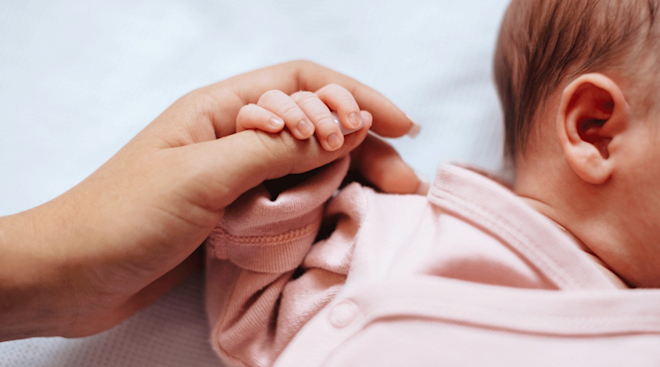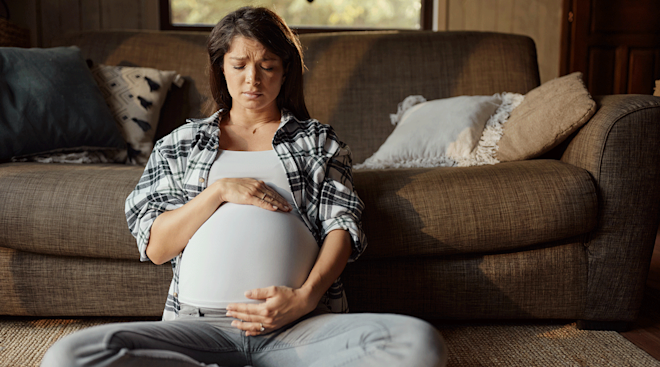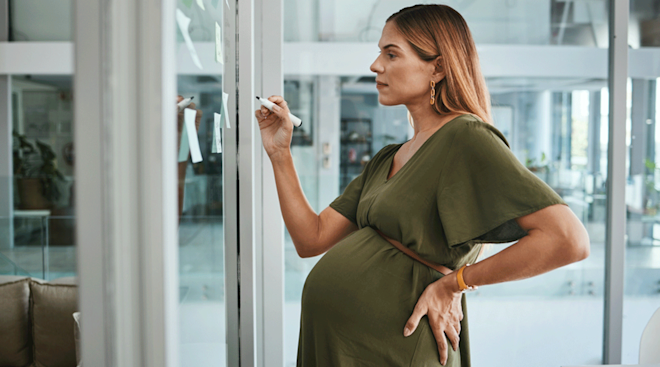The Dangers of Smoking and Vaping While Pregnant
You’ve likely heard it before: Smoking and vaping during pregnancy isn’t safe. Yet quitting cigarettes or e-cigarettes can be an uphill battle, especially if you have a years-long habit—which helps explain why more than 7 percent of pregnant people report smoking, according to the Centers for Disease Control and Prevention (CDC).
Need a little extra motivation to quit smoking while pregnant? Read on to understand how, exactly, smoking and vaping during pregnancy can harm you and baby, along with tips to help you kick the habit.
Smoking cigarettes during pregnancy is considered categorically unsafe. “No amount of exposure to tobacco, whether it’s being directly inhaled or through secondhand, is known to be safe in pregnancy,” says Kjersti Aagaard, MD, PhD, a professor of obstetrics and gynecology at Baylor College of Medicine in Houston, who has studied maternal tobacco use. Tobacco smoke contains roughly 4,000 different chemical compounds, she explains, including nicotine, polycyclic aromatic hydrocarbons (PAHs) and cadmium, in addition to particulate matter. “Those are [the] principal ones that we know can cross the placenta and have the potential for harm,” she says.
Even if you’re trying to conceive—or simply considering having a baby—it’s time to start trying to quit proactively. After all, according to the Food and Drug Administration (FDA), smoking can interfere with proper hormone production, harm your reproductive system and decrease your fertility—all of which can make the journey to parenthood more difficult.
Vaping involves heating a liquid in a device that produces an aerosol, which you then inhale. Vapes usually contain nicotine, flavorings and other chemicals that can harm both the person vaping and people who inhale the vapor secondhand.
Because vapes are relatively new, the research on whether they’re safer than traditional cigarettes is mixed—there’s no definitive answer. “Lots of people compare vaping to cigarettes and think that it’s a less harmful alternative,” says M. J. Ruzmyn Vilcassim, PhD, MS, assistant professor at the University of Alabama at Birmingham’s School of Public Health. “It’s not objectively safe, because we know that e-cigarette vapor contains chemicals that have been shown to be toxic.”
Although vapes expose you to fewer chemicals than cigarettes, they still contain a laundry list of substances that can wreak havoc on the body. Nicotine, for example, has been linked to a number of risks for babies, including problems with brain development. Research has also linked e-cigarette use to heart disease. Plus, studies show that vaping can cause inflammation in the lungs. “When you show signs of increased inflammation, that means there is some systemic injury in your body,” says Vilcassim. Inflammation can be in part due to e-cigarette flavorings, which are FDA-approved for eating and drinking but aren’t meant to be inhaled, he explains.
Despite the slim body of research on vaping, Vilcassim says it’s very likely to pose the same risks as smoking cigarettes. That means it could increase the odds of baby being born preterm, at a low birth weight or small for their gestational age. Long story short? It’s best to avoid vaping during pregnancy.
By now, doctors are pretty well-versed in the disastrous effects smoking or vaping while pregnant can have on a pregnant person and baby’s health. Research has shown that smoking can modify DNA, which impacts how genes function. This is thought to explain some of the potential negative health effects of smoking.
The impacts are long-lasting: Analysis shows that genetic changes caused by tobacco exposure during pregnancy can last at least through childhood. Smoking also creates more carbon monoxide in the body, Aagaard says, which makes it harder to supply it with oxygen and can restrict baby’s growth.
Smoking while pregnant: Risks to mom
Pregnant or not, smoking is bad for you. But if you’re expecting, there are even more consequences to consider, including:
- Problems with the placenta. Aagaard explains that tobacco and nicotine exposure during pregnancy impairs development of the placenta—an organ that plays a critical role in providing baby with the oxygen and nutrients they need to grow. Other research suggests that smoking during pregnancy increases the risk of placental abruption (the separation of the placenta from the uterus), which can lead to hemorrhage and stillbirth, and placenta previa (the placenta implanting over the cervix), which can cause serious complications during childbirth and increase the likelihood of requiring a c-section, explains Aagaard.
- Preterm labor. A 2020 study using data from more than 25 million American moms found that those who smoked even one to two cigarettes a day during the first or second trimester were at a higher risk of preterm birth.
- Abnormal bleeding. According to the CDC, smoking while pregnant doubles your risk of abnormal bleeding during pregnancy and birth, putting both you and baby at risk.
- Pregnancy loss. Research shows that smoking any amount during pregnancy increases the risk of stillbirth by 47 percent. Additionally, it increases the risk of miscarriage, per the CDC.
- Exacerbation of chronic health conditions. Smoking can make any current health issues you have—such as asthma and heart problems—even worse, says Aagaard.
- Increased risk of new health problems. The CDC notes that smoking has been shown to increase your risk of a plethora of diseases, including lung, mouth, throat and kidney cancer; heart and lung disease; stroke; diabetes; gum disease; and eye problems that can potentially cause blindness.
Smoking while pregnant: Risks to baby
If you’re smoking or vaping while pregnant, you’re not just putting your own health at risk. Here are the potential dangers to baby:
- Preterm birth. Research shows that there’s a strong connection between smoking and preterm birth, and that the earlier in pregnancy you quit the more the probability of preterm birth decreases. “Babies that experience fetal growth restriction and babies that are born prematurely have lifelong risks,” says Aagaard. These range from increased risk of obesity and metabolic disorder to lung and eye damage and learning disabilities, she says.
- Low birth weight and size. Researchers have found that the more you smoke during pregnancy, the higher the chance of baby being born at a lower weight and smaller length. This is in part due to the effects of smoking on the placenta, including the narrowing of blood vessels, as well as higher levels of carbon monoxide being transferred to baby, explains Aagaard. Her research shows that babies with a deletion in the GSTT1 gene, which occurs in roughly a third of the population, are significantly more likely to be born small if their moms smoke during pregnancy. “It doesn’t mean that if I know my baby doesn’t have a GSTT1 deletion, I can smoke. You still have all the other 4,000 compounds that you’re being exposed to,” she adds.
- Poorer lung function. According to PLOS Medicine, smoking during pregnancy can damage baby’s lungs, leading to asthma, persistent wheezing and higher odds of being hospitalized for respiratory infections during childhood.
- Visual difficulties. Research shows that children whose moms smoked 10 or more cigarettes a day while pregnant were at nearly double the risk of strabismus (crossed eyes) than kids whose moms didn’t smoke. Smoking while pregnant also increases the risk of retinopathy of prematurity, a condition where the retinas don’t fully develop after birth that often leads to vision problems.
- Issues with brain development. A 2022 study following nearly 3,000 children found that those whose moms smoked during pregnancy had lower brain volumes as well as smaller gray and white matter volumes—types of brain tissues that are essential for controlling movement, memory and emotions—at 9 to 11 years old. Nicotine impacts the production and function of neurotransmitters, which relay messages throughout your body, controlling everything from your heartbeat and blood pressure to your thoughts and emotions. Other researchers note that the impacts of smoking on brain development are noticeable starting at birth. Newborns who are exposed to smoking in the womb show symptoms of withdrawal and neurobehavioral difficulties in their first year of life, including negative mood, decreased attention, and increased excitability and irritability.
- Psychological problems in childhood. Children whose moms smoked during pregnancy are more likely to have attention and hyperactivity issues, poor school performance, behavioral problems and future substance abuse. Research shows that prenatal smoking led to a lack of coordination between brain regions during information and auditory processing in children, which researchers suspect may partly help explain the behavioral and mental health issues many of these kids experience during adolescence.
- Increased risk of sudden infant death syndrome (SIDS). Evidence suggests that up to one-third of sudden infant deaths could be prevented if moms didn’t smoke while pregnant.
- Birth defects, such as cleft palate. Research has linked tobacco exposure to cleft lip, a condition that often requires surgery in the first few months of life.
Secondhand smoke is dangerous for both Mom and baby. According to research, exposure to secondhand smoke poses the same risks as actual smoking, including low birth weight and SIDS. “Tobacco exposure doesn’t discriminate between you smoking and you being around somebody who smokes, whether you inhale it directly through the cigarette or you inhale it because you’re sitting in a car, house or bar,” says Aagaard. If a loved one smokes around you, ask them to stop—for your health and baby’s.
Many people smoke because it’s a habit, not necessarily because they’re addicted to nicotine itself, explains Aagaard. “More often than not, pregnant folks who smoke do so out of long-formed habits, which is what makes it so hard to quit,” she says. That means one of the most effective quitting methods is to figure out when you’re most likely to smoke, and change up your habits accordingly. If you have a cigarette with your coffee in the morning, for example, switch to hot tea and drink it in a place where you can’t smoke, like your office. “Change those associative behaviors,” she says.
You can also ask people you usually smoke with not to light up around you—not only to avoid the secondhand smoke, but also so you don’t become tempted. Before you hang out with them, you could even ask that they shower if they’ve smoked recently, so that you won’t be triggered by the smell. “Really think about all the things in your day-to-day life that trigger your smoking and see how you can do something different, so that chemical switch in your brain that makes you want to smoke stays off,” says Aagaard.
Quitting smoking or vaping can be incredibly difficult. If you’re really struggling to quit, know that even just reducing the amount you smoke can make a difference. “If you cannot quit altogether, cutting back as far as you can is beneficial,” says Aagaard.
Can you use nicotine replacements during pregnancy?
Nicotine replacement therapy—which comes in the form of patches, gums and more—hasn’t been well-studied in pregnancy, says Aargard. For those using it, it can cut out some of the harmful substances found in tobacco smoke—but it still contains nicotine, which is harmful for pregnancy.
Furthermore, research shows that women are less likely to be addicted to nicotine than men, which suggests that nicotine replacement therapy might not be all that helpful when you’re trying to quit. That said, if you’re unable to quit smoking during pregnancy through other methods and think you could benefit from a low dose of nicotine replacement therapy, make sure to talk to your doctor about your options.
Be patient with yourself, and keep trying to quit smoking or vaping while pregnant even if you have setbacks. “Whenever you’re embracing big, challenging change, you’re going to have to make multiple attempts before something clicks,” says Aagaard.
Please note: The Bump and the materials and information it contains are not intended to, and do not constitute, medical or other health advice or diagnosis and should not be used as such. You should always consult with a qualified physician or health professional about your specific circumstances.
Plus, more from The Bump:
Kjersti Aagaard, MD, PhD, is a professor of obstetrics and gynecology at Baylor College of Medicine in Houston. She earned her medical degree from the University of Minnesota Medical School.
M. J. Ruzmyn Vilcassim, PhD, is an assistant professor at the University of Alabama at Birmingham’s School of Public Health.
Centers of Disease Control and Prevention, NCHS Data Briefs, February 2022
Public Health Reports, Reducing Levels of Toxic Chemicals in Cigarette Smoke: A New Healthy People 2010 Objective, February 2008
US Environmental Protection Agency, Particulate Matter (PM) Basics, July 2023
US Food and Drug Administration, How Smoking Affects Reproductive Health, November 2021
Centers of Disease Control and Prevention, About Electronic Cigarettes (E-Cigarettes), May 2023
Dove Medical Press, Electronic cigarettes and cardiovascular health: what do we know so far?, June 2019
Toxics, Electronic Cigarette Use during Pregnancy: Is It Harmful?, March 2023
The Journal of Maternal-Fetal & Neonatal Medicine, Associations between electronic nicotine delivery systems and birth outcomes, December 2022
Translational Lung Cancer Research, Smoking, immunity, and DNA damage, May 2019
Annuals of Global Health, Active and Passive Maternal Smoking During Pregnancy and Birth Outcomes: A Study From a Developing Country, December 2021
American Journal of Epidemiology, Influence of Maternal Smoking on Placental Abruption in Successive Pregnancies: A Population-based Prospective Cohort Study in Sweden, June 2007
PLOS Medicine, Maternal cigarette smoking before and during pregnancy and the risk of preterm birth: A dose–response analysis of 25 million mother–infant pairs, August 2020
Centers of Disease Control and Prevention, Smoking, Pregnancy, and Babies, May 2022
BMC Public Health, Maternal smoking and the risk of still birth: systematic review and meta-analysis, March 2015
Centers of Disease Control and Prevention, Smoking During Pregnancy, April 2020
American Lung Association, The Health Effects of Smoking with Asthma, November 2022
National Heart, Lung and Blood Institute, How Smoking Affects the Heart and Blood Vessels, March 2022
Centers of Disease Control and Prevention, Health Effects of Cigarette Smoking, October 2021
JAMA Network Open, Association of Maternal Cigarette Smoking and Smoking Cessation With Preterm Birth, April 2019
BMC Pregnancy and Childbirth, Smoking during pregnancy and harm reduction in birth weight: a cross-sectional study, March 2018
International Journal of Epidemiology, Maternal smoking during pregnancy and offspring trajectories of height and adiposity: comparing maternal and paternal associations, June 2012
Obstetrics & Gynecology, Pharmacogenomics of maternal tobacco use: metabolic gene polymorphisms and risk of adverse pregnancy outcomes, March 2010
PLOS Medicine, Preterm Birth and Childhood Wheezing Disorders: A Systematic Review and Meta-Analysis, January 2014
Acta Ophthalmologica, Maternal smoking during pregnancy and the risk of strabismus in offspring: a meta-analysis, Novemver 2018
Eye, The Scientific Journal of the Royal College of Ophthalmologists, Maternal smoking as an independent risk factor for the development of severe retinopathy of prematurity in very preterm infants, March 2021
JAMA Network Open, Association of Smoking During Pregnancy With Compromised Brain Development in Offspring, August 2022
Acta Paediatrica, Infant neurobehavioural consequences of prenatal cigarette exposure: A systematic review and meta-analysis, January 2020
Nicotine & Tobacco Research, Maternal Smoking During Pregnancy and Offspring Brain Structure and Function: Review and Agenda for Future Research, April 2012
Frontiers in Pediatrics, Maternal Smoking, Alcohol and Recreational Drug Use and the Risk of SIDS Among a US Urban Black Population, May 2022
The Journal of the American Dental Association, SMOKING DURING PREGNANCY INCREASES RISK OF CLEFT LIP AND PALATE, June 2000
Indian Journal of Community Medicine, Secondhand Smoke Exposure during Pregnancy and its Effect on Birth Outcomes: Evidence from a Retrospective Cohort Study in a Tertiary Care Hospital in Bengaluru, March 2021
Addiction Biology, Gender differences in the pharmacology of nicotine addiction, October 1998
Learn how we ensure the accuracy of our content through our editorial and medical review process.
Navigate forward to interact with the calendar and select a date. Press the question mark key to get the keyboard shortcuts for changing dates.




















































